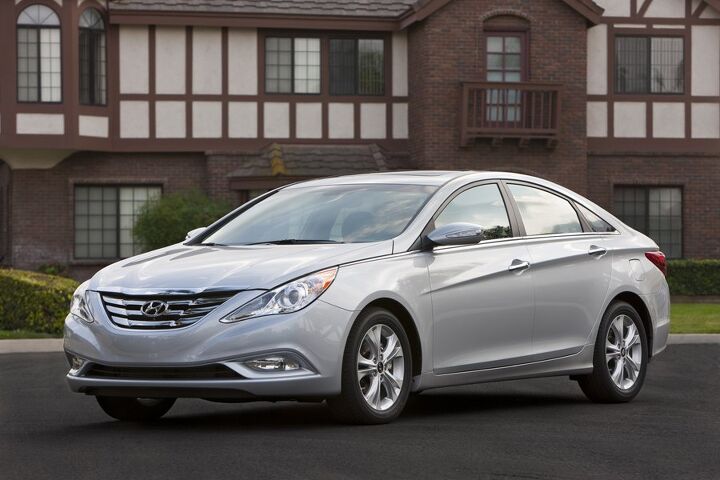Ask Jack: A Hyundai and a Moral Dilemma

After 45 years on this earth, I have come to a conclusion that is neither unique nor universal but which has considerable truth to it, regardless: The kind of stuff that alarms regular people rarely alarms experts on the subject — and vice versa. It’s true in scientific disciplines from materials science to artificial intelligence, it’s true when it comes to medical and health issues, and it’s true in matters of the law and governance. We can also add a corollary to this: Even when the experts and the regular people are both alarmed, it’s usually not for the same reason.
The idea of corporate personhood is an example of the latter. It’s common for lightly-educated political activists to screech, “CORPORATIONS ARE NOT PEOPLE!” — as if corporations had managed to start operating autonomous bipedal robots that walk among us as men and women. What they fail to realize is that corporate “personhood” actually protects both individual humans and society as a whole. As a ridiculous example to the contrary, Prince Charles and I both have the same “cutter” at Turnbull & Asser, a certain Mr. Steven Quin. He is the Royal Warrant Holder as an individual. In an earlier age, an English king could presumably have had him physically punished if his shirts didn’t measure up, as the Warrant is a transaction of sorts between a member of royalty and a subject of royalty.
While it’s very satisfying to extend this to the modern era and to imagine the CEO of BP being keelhauled for the Deepwater Horizon disaster, the fact is that without corporate personhood the responsibility for something like that would be placed on a “fall guy” or corporate sacrificial lamb — leaving companies free to break the law at will so long as they had access to people who were willing to go to jail on their behalf.
With that said, there is plenty of justified concern about some consequences of corporate personhood, most specifically as it applies to First Amendment issues and political contributions. Today’s question addresses yet another aspect of the corporation-as-individual. More precisely: Do we have a moral duty to a corporation? If so, to which one is that duty owed?
I am the owner of a Hyundai/Kia product that was the subject of a recent engine inspection recall for crankshaft debris. The vehicle failed the inspection and a new engine is on order.
The thing is, I send my engine oil for analysis regularly and I sent in a sample with the recall notice for analysis and they found no evidence of impending engine failure based on current or past samples.
Should I just be happy with the new engine or should I report this to Hyundai/Kia corporate?
I have been happy otherwise with my current vehicle but I have no attachment to this dealership as I move every couple of years.
The title of this email, sent to askjack@calamarco.com in much the same way as I would like all of you to send in all of your questions, was “Moral/Ethical Dilemma.”
Is the nature of the dilemma immediately apparent to you? If not, I’ll explain. Let’s say your neighbor sold you a loaf of bread. Two days later, he stopped by and said, “Some of the bread that I sold earlier this week turned out to be moldy. I’d like to replace your half-eaten loaf with a fresh loaf at my expense.” You go into your kitchen and discover that your half-eaten loaf has no mold on it. Would it be ethical to accept that fresh loaf of bread?
In most of the value systems created by humanity over the past 15,000 years, the answer would be, “Absolutely not.” But when the person offering you a fresh loaf of bread is not a “real” person, but a faceless corporation, is the answer different? For many people, the answer is different. They believe, rightly or wrongly, that corporations should not receive the same human consideration that people do. That’s why I felt comfortable leaving my wallet open on the nightstand of a young woman I knew who regularly shoplifted from the “Real Canadian Superstore” in Hamilton, Ontario; she had no compunction about stealing from a corporation but was scrupulously honest when dealing with flesh-and-blood people.
There is a perception, right or wrong, that corporations are engaged in a kind of zero-sum destruction game with actual human beings, reminiscent of the Terminator movies, and that only one side can win in the end. If you share this perception, then you would have no trouble telling Brett to accept that free engine from Hyundai regardless of his independent testing.
Now here’s where it gets complicated: I suspect that his dealership feels the same way. I bet that they are “failing” every engine they can in order to get “book hours” for their service techs. They have guys who can probably do the engine swap in half or two-thirds of the specified time, making it very lucrative. This in turn allows service advisors to hand out this work like candy to pacify techs who are angry at having to knock 20 years’ worth of rust and crud off the suspension of a worn-out Excel.
To the service advisors and to the dealership principal, their own human interests (extra cash, a bonus, a new boat) outweigh the corporate interests of Hyundai. They’ve decided that they have no compunction about stealing from a corporate person. That enlightened attitude has the potential to pay some benefits to Brett, who is going to get a free engine.
So what should Brett do? Should he allow Hyundai to be scammed out of a free engine, or should he speak up, decline the service, and feel good about himself? In this particular case, I think the issue isn’t quite that clear-cut. While it is true that Brett’s independent testing didn’t find the problem, it’s very possible that the independent tester isn’t entirely authoritative here. The recall notes that debris from a mechanically-deburred crankshaft can stick in the oil passages, leading to engine failure. That does not necessarily imply that there is still debris free-floating in the sump to be discovered. It could be like the heart blockages commonplace in irresponsible old goats like yours truly; I can pass a medical with flying colors, but that doesn’t mean I’m not going to flop over and die next week.
To Brett, therefore, I say, “Get yourself the new engine and don’t feel bad about it.” In this case, it’s not a matter of ethics. It’s a matter of knowledge. Hyundai may know something you don’t, and the dealership may know something you don’t. If they are willing to swap you out, then go ahead and do it with a clear conscience.
You can view it as a simple matter of mechanical probability, or you can view it as a triumph for an individual against an opaque corporation; that part is up to your own, and uniquely human, sense of perspective.
[Image: Hyundai]

More by Jack Baruth
Latest Car Reviews
Read moreLatest Product Reviews
Read moreRecent Comments
- Daniel J Our CX-5 has hit its automatic brakes a few times at in very unnecessary situations. My 2018 doesn't have it, but it will shake and throw a warning if it thinks you should brake. Only once was it needed. The dozen or so times it has gone off I was already on the brakes or traffic was in a pattern that just fooled it.
- Kosmo This would become interesting with a turbo and 6MT.
- CanadaCraig 'Afraid' is the wrong word. The question should be, "Do you trust autonomous cars to get you from point A to point B and all points in between safely?" And my answer to that question is 'NO'.
- Daniel J For us it's just woefully underpowered. Put the 2.5T in it then I might consider it.
- Bd2 Such practices are deeply frowned upon by Kia and Hyundai dealerships where consumers sport increasing credit scores and household incomes to boot.

































Comments
Join the conversation
Companies don't recall things for no reason. It is either statistically because you have a good chance of getting a bad apple so it is easier to just replace it ahead of time when you are not made, or replace it when you are very mad later. It is also much cheaper to do it to everyone now than wait till a class action lawyer come up with the idea. It is also much better for their brand image to do it now than later. Don't feel bad, you are not taking advantage of them, this is just a preventive care.
I am surprised that no one here mentions taking the engine to preserve the manufacturer's warranty. It seems to me that if Hyundai has a recall program and are willing to replace the engine now, that opting out could terminate any existing engine and/or drive-train warranty above and beyond just this singular issue. I can't imagine Hyundai would be too keen on fixing your engine months from now for anything even tangentially related to this particular issue.